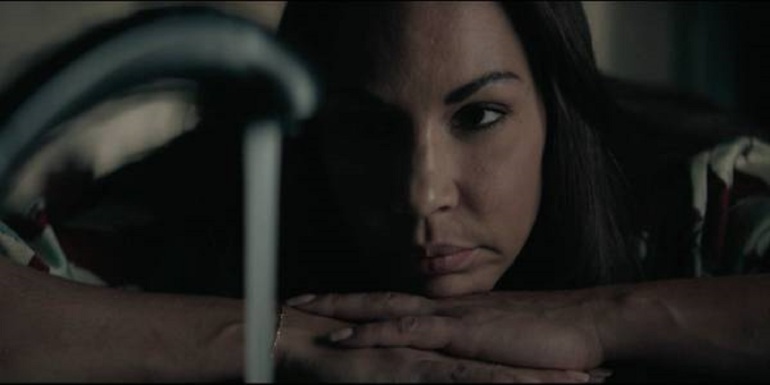It was
Set in the not-so-distance future, a pandemic has led to the death of 60 million people worldwide and time is running out for the remainder of the population. Complicating things further is that the source of the virus can be found in the water people drink. Considered the “Great Paradox”, people need water to survive, but consuming too much will cause the virus to grow within them, society has been reduced to rationing the water they consume daily. With only an estimated five years left before the virus kills off the rest of mankind, scientists are racing to find a cure.
The scientist closest to reaching the finish line is Dr. Jennifer Ashgrove (Amanda Brugel), but her relentless research has come at a great cost to her physical and emotional well-being. After a recent episode where she experienced a momentary blackout, he boss orders her to take the weekend to rest and recharge at her family’s farm. Initially unwilling to leave her time sensitive work, Jennifer reluctantly agrees to travel to the countryside with her husband Jason (Jonas Chernick) to clear her mind. While the open air may offer a brief reprieve from the fog of the pandemic, the clarity also opens Jennifer’s eyes to how strained her relationship with Jason has become.

As she attempts to navigate the turbulent waters of their union, Jennifer is unaware that the key to solving the pandemic hinges on her ability to fix the damaged canoe that their marriage is floating in.
Using water as both as a source of tension and a necessary place of bonding for the couple, LaLonde revels in the various dualities that exist within the film. This is perfectly captured in the way he explores the complex dynamics of the central couple. Ashgrove is most intriguing when it is wrestling with the stresses of Jennifer and Jason’s daily life.
For Jennifer this means carrying the unbearable weight of society on her shoulders. Few people, including Jason, understand all that her research involves and the pressures that come with work whose stakes are literally life or death. Conversely, Jason is struggling with the sense of isolation that comes with being a supportive husband to a spouse who he rarely sees. His ego must also deal with the constant, and not-so-subtle, reminders that his pursuits, such as writing a novel, are not viewed as important in Jennifer’s eyes.
The growing sense of resentment that arises when a couple no longer views each other as equals is perfectly captured by Brugel and Chernick’s wonderful performances. They each ensure that the audience understands each character’s perspective and the mistakes that further pull the strands of the relationship apart. By making their characters relatable, Brugel and Chernick ensure that one sticks with LaLonde’s film even when the narrative veers in a rather unexpected direction.
While potentially a make-or-break moment for some viewers, what makes the narrative shift so effective is the meticulous way LaLonde sets it up. His film rewards those who pay attention to the small details sprinkled throughout. Consistently proving that he is a director who refuses to be placed in a box, LaLonde confidently takes the path less traveled with each new film as one can see here. A riveting and bold work, Ashgrove offers a unique examination of the sacrifices that can pull a relationship apart.
Source link
